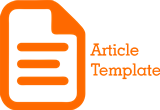Development of Teacher Work Ethics: A Literature Review
Abstract
Keywords
Full Text:
PDFReferences
Agung, I. (2010). Meningkatkan Kreativitas Pembelajaran bagi Guru. Bestari Buana Murni.
Bahri, S., Masdin, M., & Marzuki, M. (2021). Urgensi Etika dan Profesionalisme Guru dalam Perspektif Islam. Al-TA'DIB: Jurnal Kajian Ilmu Kependidikan, 14(2), 87. https://doi.org/10.31332/atdbwv14i2.1451
Fadlyansyah, R. M., & Nurhayati, S. (2020). THE IMPACTS OF TUTORS' COMMUNICATION PATTERN TOWARDS IMPROVING THE TRAINEES' LEARNING QUALITY AT THE WORK TRAINING INSTITUTE (LPK). Jurnal Ilmiah Program Studi Pendidikan Luar Sekolah, 9(2), p.
Febriana, R. (2020). Kompetensi Guru. Bumi Akasara.
Habibah, S. (2015). Akhlak dan etika dalam islam. Jurnal Pesona Dasar, 1(4).
Hamzah, H. (2017). Kompetensi Widyaiswara Dan Kualitas Diklat. PEMBELAJAR: Jurnal Ilmu Pendidikan, Keguruan, Dan Pembelajaran, 1(2), 111. https://doi.org/10.26858/pembelajar.v1i2.4865
Hasan, E. S., & Nurhayati, S. (2012). Pendidikan Luar Sekolah Dan Pembangunan Manusia Indonesia. Empowerment, 1(1), 1-12. https://doi.org/https://doi.org/10.22460/empowerment.v1i1p%25p.361
Mariana, D. (2021). Pengaruh Kepemimpinan Kepala Sekolah Terhadap Efektivitas Sekolah Penggerak dalam Meningkatkan Kualitas Pendidikan. 5(20), 10228-10233.
Musa, S., & Nurhayati, S. (2021). Analysis of counting learning difficulties in illiterate adults. The 2nd Science and Mathematics International Conference (SMIC 2020), 2331. https://doi.org/10.1063/5.0041739
Musa, S., Nurhayati, S., Jabar, R., Sulaimawan, D., & Fauziddin, M. (2022). Upaya dan Tantangan Kepala Sekolah PAUD dalam Mengembangkan Lembaga dan Memotivasi Guru untuk Mengikuti Program Sekolah Penggerak. Obsesi, 6(5), 4239-4254. https://doi.org/10.31004/obsesi.v6i5.2624
Musa, S., Uthartianty, R., & Nurhayati, S. (2020). Upaya Pengelolaan Kelompok Bermain dalam Menempuh Akreditasi Lembaga Sesuai Standar Nasional Pendidikan. Judika: Jurnal Pendidikan Unsika, 8(2), 133-140.
Nurhayati, S. (2015). Andragogical Content Knowledge as a Key Component in the Training of the Instructors of Nonformal Education. International Education Studies, 8(2), 219-230. https://doi.org/10.5539/ies.v8n2p219
Nurhayati, S. (2018). PENGEMBANGAN MODEL PELATIHAN DENGAN PENDEKATAN EXPERIENTIAL LEARNING UNTUK MENINGKATKAN KOMPETENSI ASESMEN PEMBELAJARAN BAGI PENDIDIK PAUD DI KOTA CIMAHI [Universitas Pendidikan Indonesia]. http://repository.upi.edu/35474/
Nurhayati, S. (2020). Improving teachers' entrepreneurship skills in the Industry 4.0 through online business workshops. In Teacher Education and Professional Development in Industry 4.0. Taylor & Francis.
Nurhayati, S. (2021). Pendidikan Masyarakat Menghadapi Digitalisasi. El-Markazi.
Nurhayati, S., & Rakhman, A. (2017). Studi Kompetensi Guru Paud Dalam Melakukan Asesmen Pembelajaran Dan Perkembangan Anak Usia Dini Di Kota Cimahi. Jurnal Pendidikan Anak, 6(2), 109-120. https://doi.org/10.21831/jpa.v6i2.17699
Nurmalia, N., Nurhayati, S., & Noor, A. H. (2022). Developing Students' Leadership Spirit during COVID-19 Pandemic through Virtual-Based Scouting Activities. Society, 10(2), 447-456. https://doi.org/10.33019/society.v10i2.412
Rochman & Gunawan. (2016). Pengembangan Kompetensi Kepribadian Guru menjadi Pendidik yang dicintai dan diteladani Siswa. Nuansa.
Sijabat, O. P., Manao, M. M., Situmorang, A. R., Hutauruk, A., & Panjaitan, S. (2022). Mengatur Kualitas Guru Melalui Program Guru Penggerak. Journal of Educational Learning and Innovation (ELIa), 2(1), 130-144. https://doi.org/10.46229/elia.v2i1.404
Sudarma, M. (2013). Profesi Guru/Dipuji, Dikritisi, dan Dicaci. Rajawali Pers.
Sugiyono. (2018). Metode Penelitian Kuantitatif, Kualitaatif, dan R&D (Sutopo, Ed.). Alfabeta.
DOI: http://dx.doi.org/10.37905/aksara.9.3.1559-1566.2023
Refbacks
- There are currently no refbacks.
Copyright (c) 2023 Aksara: Jurnal Ilmu Pendidikan Nonformal

This work is licensed under a Creative Commons Attribution-ShareAlike 4.0 International License.
Publisher:
Magister Pendidikan Nonformal Pascasarjana Universitas Negeri Gorontalo
Jl. Soedirman No. 06 Gorontalo 96128 e-mail: jurnalaksara@ung.ac.id
http://ejurnal.pps.ung.ac.id







